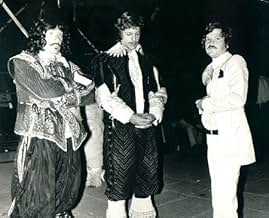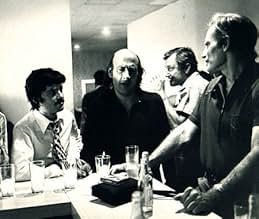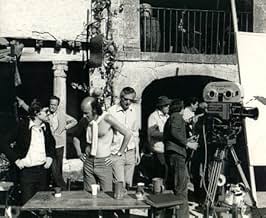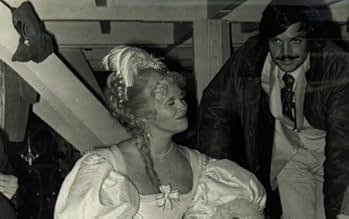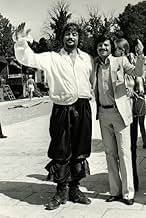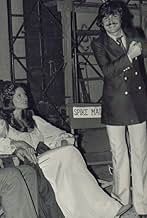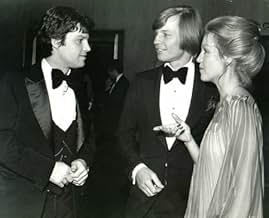NOTE IMDb
7,1/10
21 k
MA NOTE
Un jeune bretteur est confronté à son arrivée à Paris à des brigands, au fil de ses aventures composées de romance et d'intrigues, il se lie d'amitié avec trois mousquetaires.Un jeune bretteur est confronté à son arrivée à Paris à des brigands, au fil de ses aventures composées de romance et d'intrigues, il se lie d'amitié avec trois mousquetaires.Un jeune bretteur est confronté à son arrivée à Paris à des brigands, au fil de ses aventures composées de romance et d'intrigues, il se lie d'amitié avec trois mousquetaires.
- Nomination aux 5 BAFTA Awards
- 4 victoires et 7 nominations au total
Jean-Pierre Cassel
- King Louis XIII
- (as Jean Pierre Cassel)
Histoire
Le saviez-vous
- AnecdotesThe cast stayed at a plush hotel in Madrid. As a practical joke, Oliver Reed removed the goldfish from the ornamental pond in the dining room late at night, keeping them in his bath, and replaced them with fish-shaped carrots. The next morning at breakfast, he dove into the pool and began devouring the fake fish. The manager called the police and Reed was hauled off the premises bellowing, "You can't touch me! I'm one of the Musketeers!"
- GaffesRichelieu refers to Buckingham as the Prime Minister of England. However, the title was not adopted until the early 1700s, and even then was an unofficial name for the First Lord of the Treasury. It was not until 1937 that it was enshrined in law as the title of the Head of Government. Although Buckingham was undoubtedly one of the most powerful members of the English Court, he had no formal position as such, as there was no equivalent of a Prime Minister: the King himself was regarded as the Head of Government as well as Head of State.
- Citations
Cardinal Richelieu: Who is the man that accuses you?
Bonacieux: [Rochefort enters and Bonacieux points at him] That! That is the man!
Count Rochefort: Take him away.
Bonacieux: That is *not* the man!
- ConnexionsEdited into On l'appelait Milady (1974)
Commentaire à la une
Richard Lester did what no one before or since has been able to do: tell Dumas' story as magnificently as it deserves to be told. This tale gets told again and again in Hollywood, but leave it to a European to do it right. The cinematography, sets, and costumes are all fantastic, but they aren't all clean and impossibly perfect like the 1948 Gene Kelly or 1993 Kiefer Sutherland versions. Lester infuses this familiar story with an energy and tone that made his work with the Beatles successful. Yes, "The Three Musketeers" is an intriguing adventure, but the humor in their friendship, that's what draws me in again and again. And what an amazing cast he had to work with: all the Musketeers are perfect, especially big Oliver Reed, who can be silly, witty, and scary all in the same scene. The supporting cast is full of great actors, including Charlton Heston (having fun at being evil here), Christopher Lee (gets to mix deadpan humor in with his menace), Raquel Welch (cast as beautiful but clumsy, really enabling her to be a character and not just a live mannequin), Spike Milligan (doing what he does best), and most wonderfully Faye Dunaway (seductively evil: my favorite kind!). And, of course, holding it all together as D'Artagnan is Michael York, who never found a greater role.
Besides handling the shifts in tone well, Richard Lester also had the great rare luxury of breaking Dumas' large novel into two seperate movies which he filmed simultaneously. This really allows for greater character development and a truly epic scale. All of the other film versions try to cram all of that plot into 120 minutes. Not only is it impossible (in the 1993 version they simply change it completely using only the basic idea of Dumas' book), but it makes this huge complicated story with many threads seem contrived and ridiculous (the 1948 version has such dramatic and sudden shifts of tone - from wacky comedy, to romance, to heavy drama - that it can confuse and lose the audience).
This is great moviemaking.
Besides handling the shifts in tone well, Richard Lester also had the great rare luxury of breaking Dumas' large novel into two seperate movies which he filmed simultaneously. This really allows for greater character development and a truly epic scale. All of the other film versions try to cram all of that plot into 120 minutes. Not only is it impossible (in the 1993 version they simply change it completely using only the basic idea of Dumas' book), but it makes this huge complicated story with many threads seem contrived and ridiculous (the 1948 version has such dramatic and sudden shifts of tone - from wacky comedy, to romance, to heavy drama - that it can confuse and lose the audience).
This is great moviemaking.
- Holden_Pike
- 19 oct. 1998
- Permalien
Meilleurs choix
Connectez-vous pour évaluer et suivre la liste de favoris afin de recevoir des recommandations personnalisées
Détails
- Date de sortie
- Pays d’origine
- Site officiel
- Langue
- Aussi connu sous le nom de
- Les ferrets de la reine
- Lieux de tournage
- Summer Palace, Aranjuez, Madrid, Espagne(The Louvre)
- Sociétés de production
- Voir plus de crédits d'entreprise sur IMDbPro
Box-office
- Budget
- 4 500 000 $US (estimé)
- Durée1 heure 46 minutes
- Mixage
- Rapport de forme
- 1.85 : 1
Contribuer à cette page
Suggérer une modification ou ajouter du contenu manquant

Lacune principale
By what name was Les trois mousquetaires (1973) officially released in India in Hindi?
Répondre

